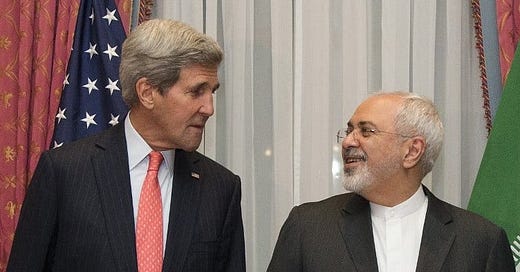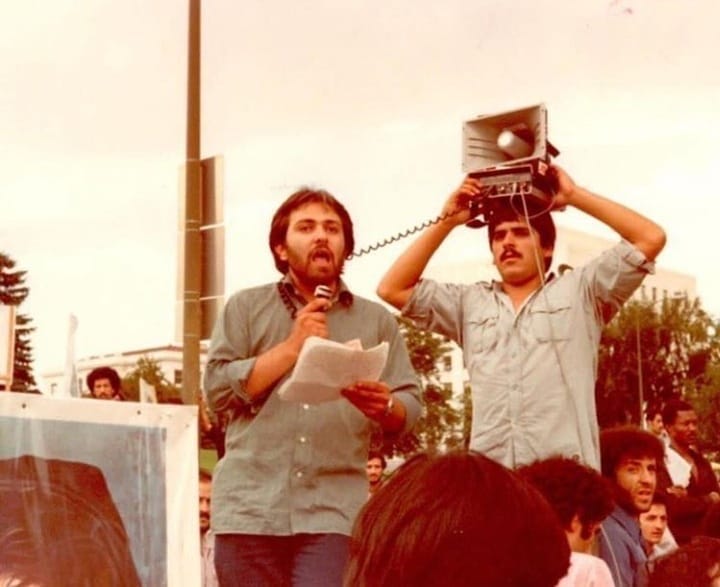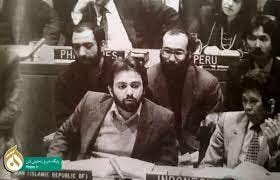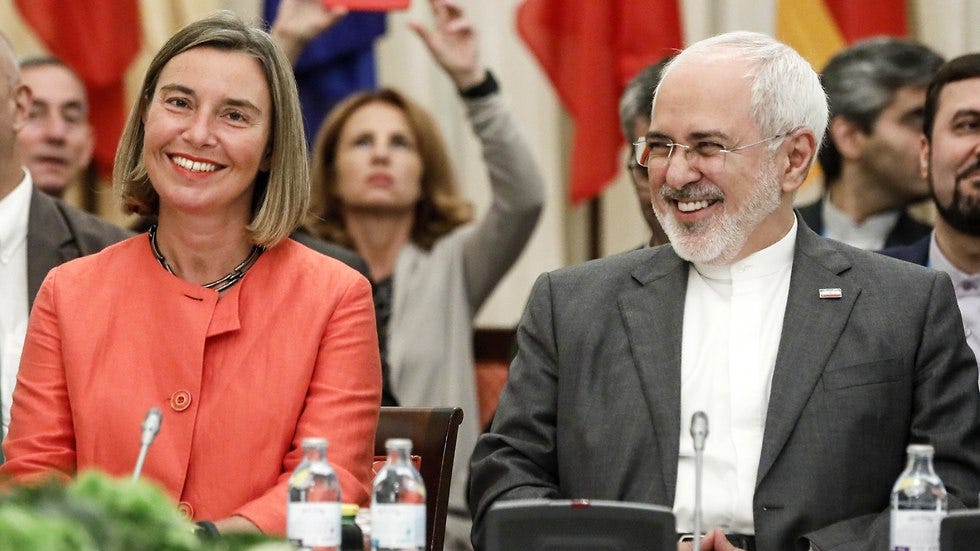Javad Zarif, the Conman and Master of Western Manipulation Demands the Firing of IAEA Chief
US Secretary of State John Kerry (left) and his Iranian counterpart Mohammad Javad Zarif. (AFP/Brian Snyder, Pool)
Mohammad Javad Zarif—the velvet-tongued apologist for the Islamic regime in Iran, long considered the darling of Western diplomats—has reemerged, barking demands like a disgraced mobster who still thinks he can sway the judge. This week, the former foreign minister called for the dismissal and prosecution of Rafael Grossi, the head of the International Atomic Energy Agency, accusing him of being “aligned with Israeli intelligence” and “not impartial.” The irony, of course, is suffocating: a man who built his career lying on behalf of a regime that executes protesters and buries nuclear sites under hospitals is now crying foul over bias.
Zarif’s latest outburst is just another chapter in a long saga of deceit and duplicity—a saga that began not in Tehran, but in the plush suburbs of Westchester, New York. While Iranians back home were dealing with revolution, repression, and war, young Zarif was living comfortably in America, attending prep school in San Francisco and later collecting degrees in international relations from San Francisco State and the University of Denver. He was part of the Iranian diaspora that rallied against the Shah in the U.S. in the late 1970s, attending protests in New York while enjoying the very freedoms denied to Iranians under the regime he would one day represent.
Zarif leading anti-Shah protests in 1980 New York City
He spoke the language of American academia. He dressed the part. He understood the cultural codes. And when the time came, he leveraged all of it—not to bring change to Iran, but to sell the West a fantasy of moderation while Tehran’s enrichment centrifuges spun in secret.
His charm offensive played perfectly to the naive moral compass of Western officials. John Kerry in particular seemed spellbound, meeting Zarif with the kind of collegial warmth usually reserved for NATO allies. The two men shared hours of closed-door conversations, and when Donald Trump entered the White House in 2016 and shredded the JCPOA, Zarif quietly continued his back-channel rapport with Kerry. The pair met in Paris, according to multiple sources, and kept lines of communication open throughout the Trump administration—undermining official U.S. policy while pretending to do the opposite.
Zarif’s reach didn’t end there. He nurtured a generation of regime apologists and lobbyists in the West, most notably Trita Parsi, founder of the National Iranian American Council (NIAC). While Parsi handled the footwork in Washington—posing as a neutral voice for diplomacy—Zarif provided ideological cover. Together, they shaped the narrative that Iran was misunderstood, that the real danger was Western intransigence, not the Khomeinist regime’s genocidal ambitions or its proxy terror empire stretching from Gaza to Yemen.
Zarif, who was serving as a senior diplomat at Iran's Permanent Mission to the United Nations in New York, photographed here at the third committee meeting at the UN General Assembly in October 1990.
Before becoming foreign minister, Zarif served as the regime’s ambassador to the United Nations in New York from 2002 to 2007. It was during this time that he laid the foundation for his network of influence inside the Democratic Party. Zarif was not just a fixture of diplomatic cocktail circuits—he was cultivating long-term relationships with powerful Democrats on Capitol Hill, policy think tanks, and academic institutions. His soft-spoken persona and fluency in English allowed him to quietly embed himself into the very corridors of American power while representing one of the world’s most brutal regimes.
EU foreign policy chief Federica Mogherini and Iranian Foreign Minister Javad Zarif (צילום: MCT)
Then there’s his murkier network in Europe. Zarif was reportedly close to Federica Mogherini, the EU’s foreign policy chief during the JCPOA negotiations. The two were often photographed smiling together, and Mogherini became one of the most vocal defenders of the deal long after its collapse. Rumors of their personal rapport—whispers of a “special relationship”—have long circulated in diplomatic circles. What’s certain is that Zarif knew how to work the room, whether in Brussels, Vienna, or New York.
And if all that wasn’t enough, Zarif himself has admitted to working closely with George Soros’s network—a relationship buried beneath layers of plausible deniability but acknowledged during public interviews. The man who railed against “foreign interference” on behalf of the Islamic regime was quite comfortable taking counsel from one of the most influential global political financiers in the West.
Let us not forget: this is not a diplomat; this is a career propagandist. His job was never to bring peace—it was to buy time. Every speech, every photo-op, every negotiation was calibrated to weaken international resolve while Iran marched steadily toward nuclear capability. He played the role of the urbane moderate while Tehran tortured dissidents and hanged teenagers from cranes.
Now, having been sidelined by Tehran’s hardliners, Zarif wants back in. He’s trying to position himself as the voice of reason, as the elder statesman. His demand for Grossi’s removal isn’t a critique—it’s a threat. A message to the West that the regime still has its smooth-talking agents in reserve, waiting to be reactivated when the time is right.
But the world has changed. The script no longer holds. The JCPOA is dead. Iran’s lies are no longer masked by diplomatic charm. And the people of Iran—those who’ve been beaten, raped, jailed, and disappeared—are no longer willing to tolerate intermediaries who play both sides while lining their pockets.
Zarif’s time is up. No amount of soft focus interviews or European smiles can erase his role in building the myth of a moderate regime. He was not a peacemaker—he was its most effective salesman. And like all salesmen caught in a scam, he should not be trusted with another word, another platform, or another deal.








